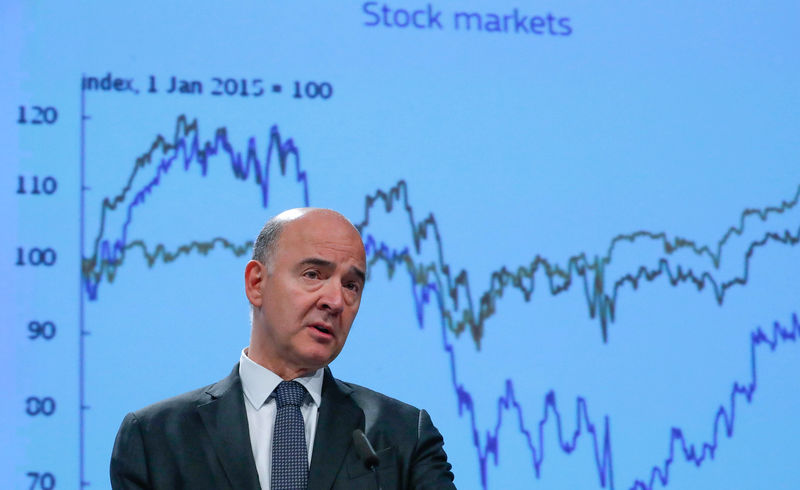 © Reuters. European Commissioner for Economic and Financial Affairs Moscovici presents the EU executive’s autumn economic forecasts in Brussels
© Reuters. European Commissioner for Economic and Financial Affairs Moscovici presents the EU executive’s autumn economic forecasts in BrusselsBy Francesco Guarascio
BRUSSELS (Reuters) – The European Union’s tax commissioner on Tuesday called on the bloc’s governments to be ambitious when they decide on a common blacklist of tax havens next week and said European funding to countries on the list should be frozen.
In the wake of disclosures of offshore tax avoidance schemes by corporations and wealthy individuals, EU states launched a process to list tax havens to try to discourage setting up shell structures abroad which are in many cases legal but could hide illicit activities.
After about one year of talks, EU finance ministers are expected on Dec. 5 to adopt the blacklist, although governments remain divided over which jurisdictions to include on the list and on sanctions.
“I invite member states to urgently adopt before the end of the year the European list of jurisdictions that refuse to reform their tax rules to comply with European standards,” Pierre Moscovici told EU lawmakers at a hearing in the European Parliament.
EU states currently have their own national lists of non-cooperative jurisdictions on tax matters – though many of them are empty.
Under public pressure following the Panama Papers and other leaks of financial documents, EU governments agreed to set up a common blacklist.
They have screened 92 jurisdictions worldwide against a set of criteria meant to measure tax transparency, use of harmful tax practices and cooperation on fiscal matters.
Moscovici told lawmakers that “some countries” have changed their tax rules after EU pressure and “half (of the 92) have committed to do so in 2018”.
It remains unclear how many countries will end up in the EU blacklist. Those who are not compliant but have committed to change their tax rules are likely to be included in a separate, “grey list”, as several EU officials call it, which might not be made public.
Some islands recently hit by hurricanes will also be given more time to comply.
SANCTIONS
It is also undecided which sanctions could be applied. A withholding levy could for instance be charged on transactions to blacklisted countries, but some EU states could decide not to apply countermeasures – a discretion that could create loopholes.
Some states, such as Luxembourg and Malta, have opposed sanctions saying that the mere listing would amount to an important reputational blow.
Moscovici said the Commission would propose sanctions linked to the use of EU funds.
“The Commission will propose to have strong and dissuasive sanctions,” he told lawmakers, adding that funds provided by the EU budget, the European Bank for Reconstruction and Development and the European Investment Bank could be frozen for countries on the list.
Anti-poverty and fair tax groups said if EU criteria were applied to EU countries, some of them, such as Luxembourg, the Netherlands, Malta and Ireland, would end up in the list.
The EU listing process did not include the bloc’s 28 member states in a bid to avoid dooming the process from its outset, as each EU nation wields a veto power on tax issues.
A Commission spokeswoman said on Tuesday that all EU states “fully comply” with the criteria set to establish the tax havens’ blacklist.
But Moscovici said later on Tuesday some EU states still applied “harmful tax practices which lead to aggressive tax planning”, and cited cases in Britain, Malta and the Netherlands.
He urged EU states to apply as soon as possible anti-tax avoidance legislation agreed at EU level but due to enter into force only in coming years.
Source: Investing.com




























